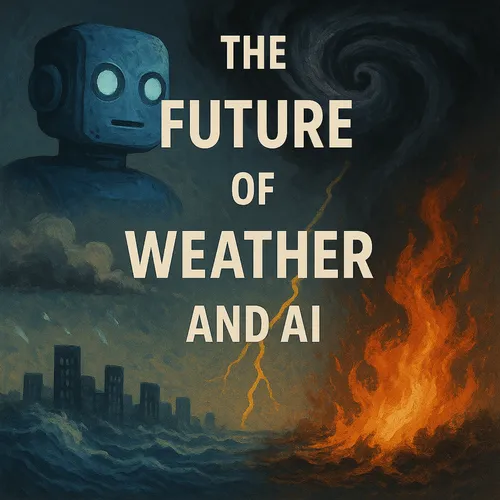
AI Extreme Weather and Climate
Brace yourself for a deep dive into the science of how artificial intelligence is revolutionizing our understanding of extreme weather and climate change. Each episode brings you cutting-edge research and insights on how AI-powered tools are being used to predict and mitigate natural disasters like floods, droughts, and wildfires. We'll unravel the complexities of climate models, explore the frontiers of AI-powered early warning systems, and discuss the ethical implications of AI-driven solutions. Join us as we break down the science and uncover the transformative potential of AI in tackling our planet's most pressing challenges.
- Update frequency
- every 22 days
- Average duration
- 20 minutes
- Episodes
- 8
- Years Active
- 2025

Ep.8 AQUAH: An Automatic Quantification and Unified Agent in Hydrology
Welcome to a new episode where we dive into AQUAH, the Automatic Quantification and Unified Agent in Hydrology! This groundbreaking system is the first end-to-end language-based agent specifically de…

Ep 7. cBottle: Climate in a bottle - foundational AI weather prediction
cBottle, developed by NVIDIA, is a generative diffusion-based framework that acts as a generative foundation model for the global atmosphere. It directly tackles the challenge of petabyte-scale clima…

Ep.6 How to fine tune a weather foundation model to hydrological variables?
This research evaluates the performance of the Aurora weather foundation model by using lightweight decoders to predict hydrological and energy variables not included in its original training. The st…

Ep.5 What is foundation model - drawing from numerical simulation
When we talk about foundation models, what are we talking about? This is a reflection piece on foundation models by drawing an analogy from numerical solutions in fluid dynamics.
This paper explore t…

Ep.4 Any-to-any Earth Observation Generation and Thinking - TerraMind
IBM recently released the first-of-its-kind geospatial intelligence any-to-any model TerraMind. In this podcast, we feature this new generative model and learn its capability of multi-modality. I bel…

Ep.3 Geospatial foundation model - Prithvi
Today, we are featuring a geospatial foundation model Prithvi, produced by NASA and IBM, one of the first foundation model in this space.
Trained on a large global dataset of NASA’s Harmonized Landsa…

Ep.2 AI models for flood forecasting - HydrographNet
This research article introduces HydroGraphNet, a novel physics-informed graph neural network for improved flood forecasting. Traditional hydrodynamic models are computationally expensive, while mach…

Ep.1 AI models for weather forecasting
We are featuring three papers:
Mardani, M., Brenowitz, N., Cohen, Y., Pathak, J., Chen, C., Liu, C., Vahdat, A., Nabian, M. A., Ge, T., Subramaniam, A., Kashinath, K., Kautz, J., & Pritchard, M. (2025…